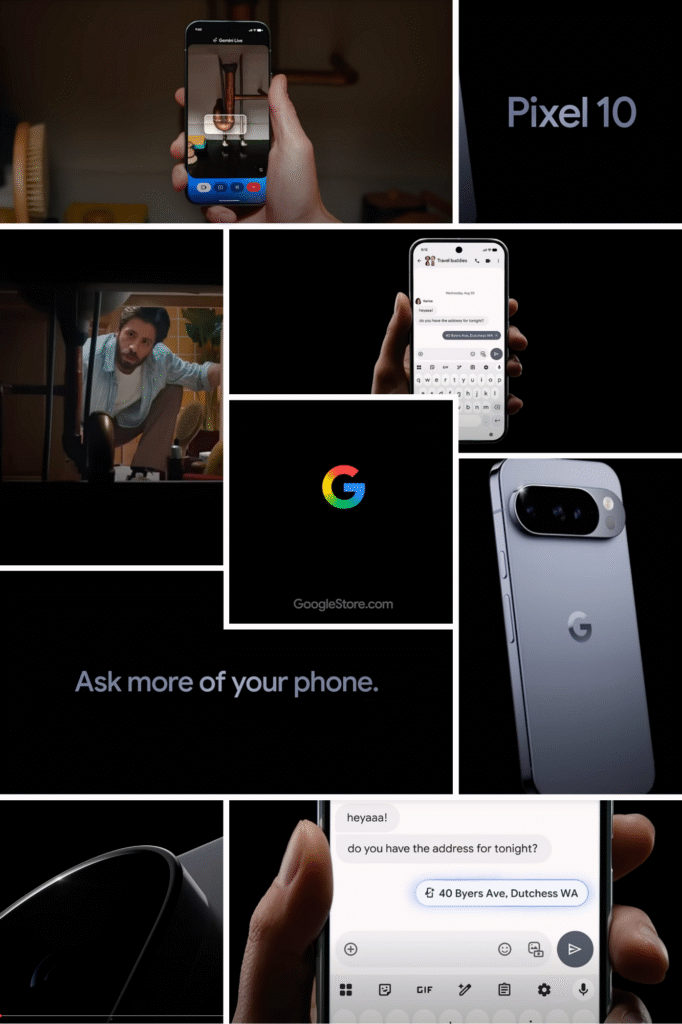
- The Clever Bits: When Self-Deprecation Actually Works
- The Questionable Bits: Where Authenticity Gets Slippery
- The Genuinely Problematic Bits: Where Good Marketing Becomes Bad Culture
- The Privacy Sleight of Hand: What Remains Invisible
- The Status Symbol Strategy: Efficiency as Social Currency
- The Authenticity Paradox: Being Honest About Being Dishonest
- What Actually Works: The Strengths Worth Acknowledging
- What Needs Improvement: The Fixable Problems
- What's Actually Harmful: The Unfixable Issues
- The Broader Context: Industry Evolution
- The Cultural Implications: What We're Really Buying
- The Final Assessment: Admiration and Concern
Google’s latest Pixel 10 campaign deserves grudging admiration, if only for its sheer audacity. The company has managed to sell artificial intelligence by pretending not to sell artificial intelligence—a feat roughly equivalent to opening a restaurant by insisting you don’t serve food.
The result is advertising that feels refreshingly self-aware whilst being precisely as manipulative as everything it claims to reject. It’s rather like watching a magician explain their tricks whilst performing them—you appreciate the transparency, even as you’re being thoroughly deceived.
The Clever Bits: When Self-Deprecation Actually Works
Google’s opening gambit in the Gemini Live advertisement is genuinely disarming:
“Any phone looks impressive in a shiny commercial. But… Does it still look impressive… under your bathroom sink?”
This represents marketing cleverness at its finest[1]. By acknowledging the absurdity of tech advertising, Google immediately positions itself as different from competitors who still earnestly tout “revolutionary breakthroughs” with straight faces.
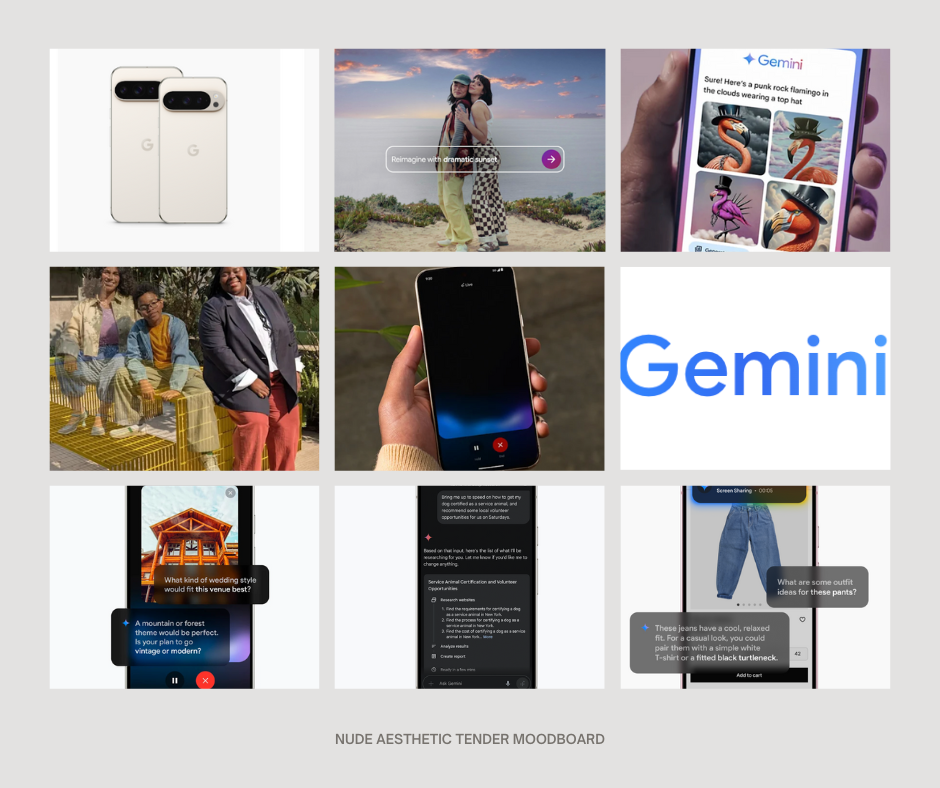
The follow-through is equally astute. Rather than demonstrating AI through the usual glossy scenarios—helping users compose emails or recognising celebrities—Google chooses plumbing emergencies[2]. It’s domestic, relatable, and authentically stressful. The choice reveals genuine understanding of how technology anxiety manifests in daily life.
Similarly, Magic Cue’s central premise is genuinely insightful:
“If your friend sends a message asking for an address in your phone? Shouldn’t the first one to find it be your phone?”
This captures something real about smartphone friction that users experience but rarely articulate[3]. The scenario feels obvious once stated, which is precisely the mark of effective positioning.
The Questionable Bits: Where Authenticity Gets Slippery
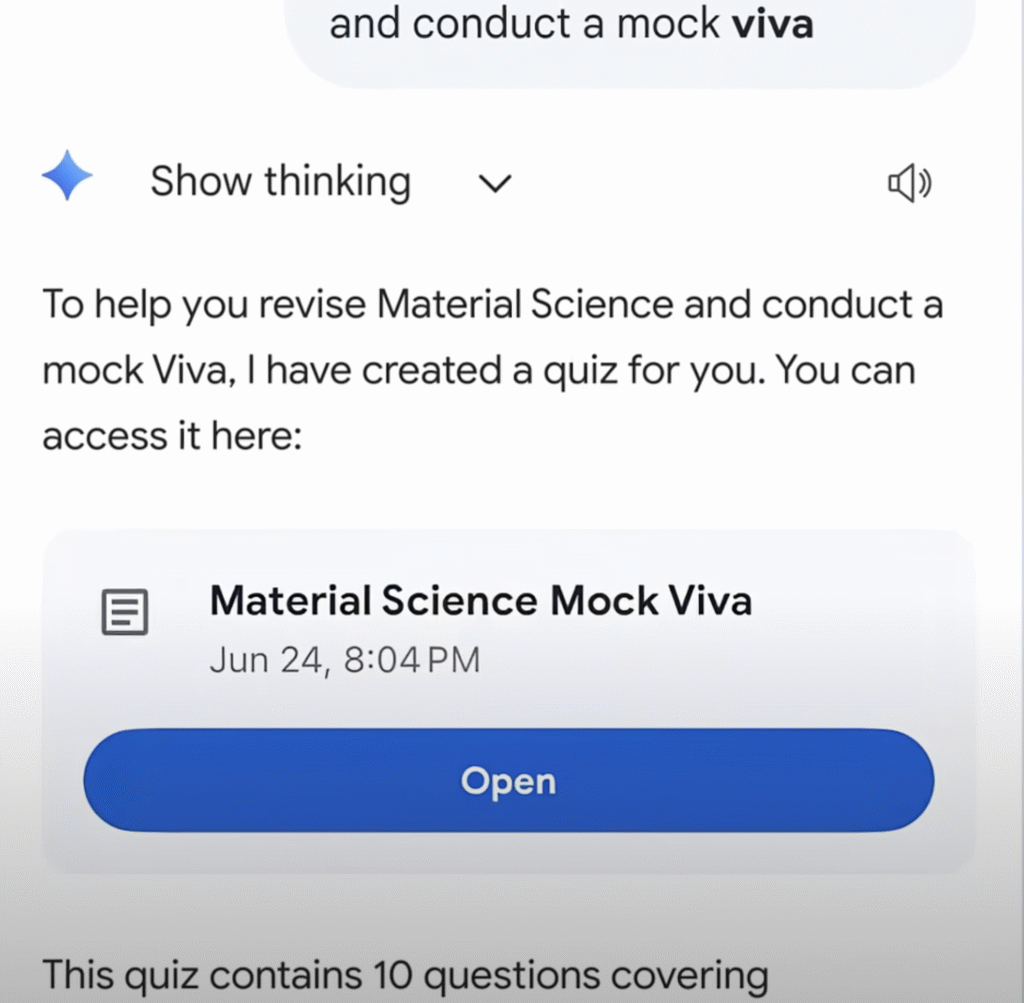
The problems begin with execution. Google’s anti-advertising stance creates space for claims that would seem preposterous in traditional commercials. After mocking “shiny” marketing, the company proceeds to demonstrate AI that can visually analyse plumbing systems and provide expert repair guidance[2].
This is rather like criticising flashy restaurants whilst serving molecular gastronomy. The self-awareness doesn’t make the underlying premise less extraordinary.
The drainage scenario, whilst relatable, represents precisely the kind of curated demonstration Google appears to critique[4]. Real-world AI assistance involves context errors, misinterpretations, and safety concerns that never appear in the advertisement. The controlled environment obscures these limitations behind effortless competence—exactly what traditional tech marketing does.
Magic Cue’s seamless contextual connections similarly sidestep complex realities. Cross-app data synthesis requires extensive permissions and struggles with privacy constraints the advertisement never acknowledges[5]. The visual presentation suggests capabilities that current technology cannot reliably deliver.
The Genuinely Problematic Bits: Where Good Marketing Becomes Bad Culture
Both advertisements systematically eliminate human expertise from consideration. This isn’t merely questionable marketing—it’s actively harmful cultural messaging.
Rather than suggesting users contact plumbers, consult tutorials, or seek help from knowledgeable friends, Google positions AI as the optimal first response[2]. Magic Cue similarly bypasses the social act of asking friends for clarification, celebrating technological anticipation over human interaction.
This reflects broader Silicon Valley thinking that treats human relationships as inefficiencies awaiting algorithmic optimisation. Recent backlash against Google’s Olympic advertisement—where a parent used AI to help their child write a fan letter—highlighted similar concerns about replacing authentic human experiences with computational convenience[6].
The advertisements perform cultural work that extends beyond product promotion. They normalise AI dependency for basic problem-solving whilst positioning technological self-reliance as sophisticated advancement.
The Privacy Sleight of Hand: What Remains Invisible
Both campaigns promise effortless experiences whilst carefully obscuring their technical requirements. Contextual AI demands constant monitoring of communications, calendar entries, and location data[7]. The privacy implications remain invisible whilst convenience takes centre stage.
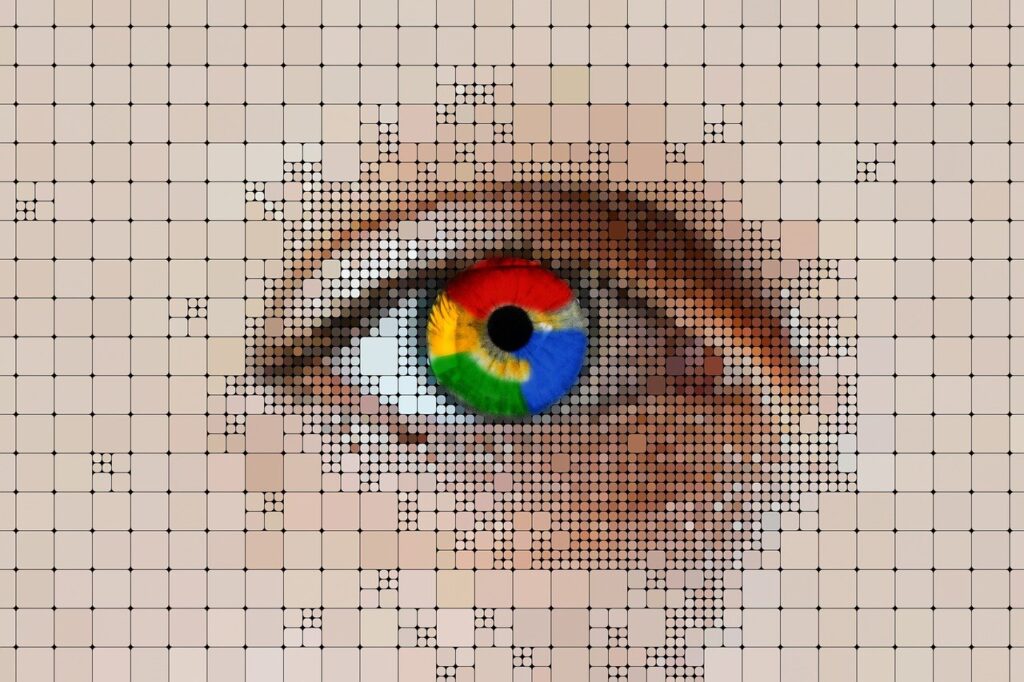
This represents sophisticated misdirection. Google celebrates “invisible” AI assistance without acknowledging that invisibility depends on extensive data collection and algorithmic inference[8]. Users delight in magic whilst rarely pondering the surveillance infrastructure enabling those moments of utility.
According to research, sixty-two per cent of users would trust companies whose AI interactions respect privacy, yet seventy-one per cent remain unwilling to compromise privacy for AI convenience[9]. Google’s advertisements exploit this contradiction by emphasising benefits whilst minimising costs.
The Status Symbol Strategy: Efficiency as Social Currency
Google’s positioning reveals genuine insight into contemporary digital culture. The advertisements reframe efficiency as sophistication, suggesting that technological mastery means making technology invisible.
The tagline “less digging, more doing” positions seamless AI assistance as evidence of digital fluency rather than mere convenience[3]. This taps into real anxieties about technological competence whilst offering a flattering resolution.
The implicit hierarchy appears throughout both campaigns: users who manually search apps or consult human experts seem digitally unsophisticated. Conversely, users whose devices anticipate needs demonstrate modern competence. This social positioning makes adoption feel like advancement rather than consumption.
The strategy is effective precisely because it contains truth. Digital fluency increasingly means understanding how to make technology work for you rather than working within technological constraints.
The Authenticity Paradox: Being Honest About Being Dishonest
Google’s campaigns succeed because they resolve the authenticity paradox through elegant misdirection. They acknowledge artificial marketing whilst creating space for technological overselling they claim to eschew.
This represents marketing evolution rather than revolution. Instead of abandoning hyperbole, Google transforms it into something more palatable. The “authentic” domestic scenarios become stages for demonstrating capabilities that may not translate to genuine utility beyond controlled demonstrations.
The genius lies in making revolutionary claims feel inevitable rather than extraordinary. By grounding AI capabilities in relatable scenarios, Google transforms technological adoption from conscious decision into unconscious assumption.
What Actually Works: The Strengths Worth Acknowledging
Google deserves credit for several genuine innovations in technology marketing:
- Emotional Register: The understated tone feels refreshing after years of breathless “revolutionary breakthrough” messaging. The quiet confidence suggests maturity and restraint.
- Scenario Selection: Choosing unglamorous but relatable situations demonstrates genuine user empathy. Most people have experienced similar domestic crises and smartphone friction.
- Self-Awareness: Acknowledging marketing absurdity creates genuine rapport with audiences tired of tech industry hyperbole.
- Cultural Insight: Understanding efficiency as social currency reflects accurate reading of contemporary digital anxiety.
What Needs Improvement: The Fixable Problems
- Technical Honesty: The advertisements could acknowledge AI limitations without undermining their core message. Brief disclaimers about optimal conditions or occasional errors would enhance rather than diminish credibility.
- Human Integration: Positioning AI as complement to rather than replacement for human expertise would address cultural concerns whilst maintaining technological enthusiasm.
- Privacy Transparency: Acknowledging data requirements for contextual features would demonstrate genuine commitment to user agency rather than magical thinking.
What’s Actually Harmful: The Unfixable Issues
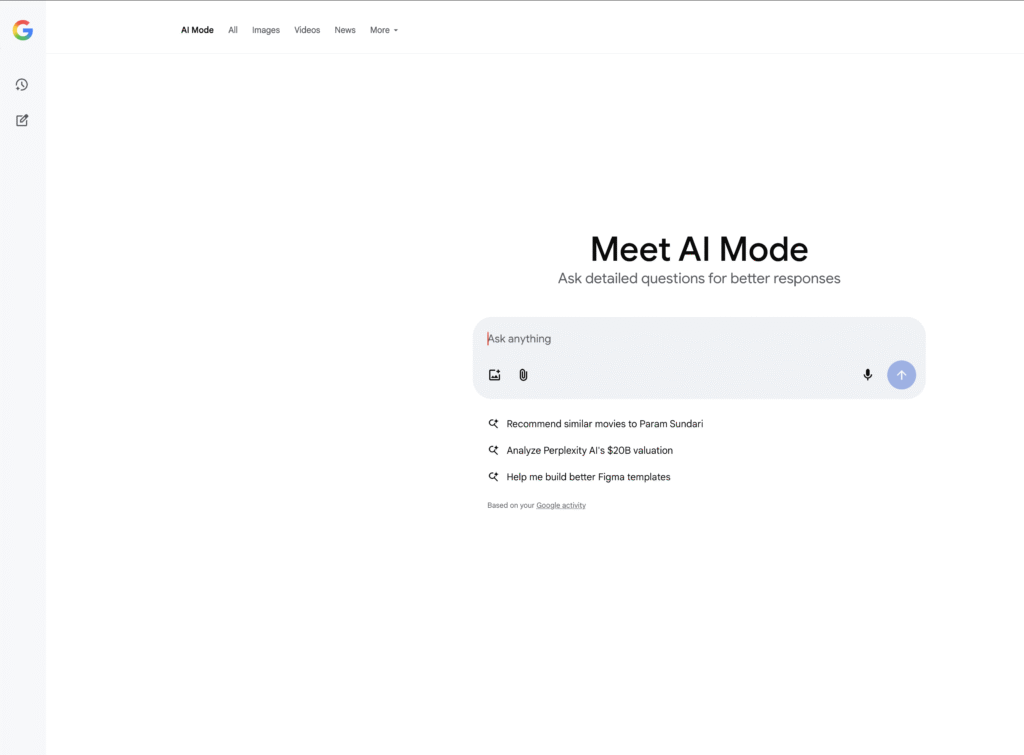
- Dependency Normalisation: Encouraging AI consultation as first response to practical challenges undermines human self-reliance and social connection.
- Expertise Devaluation: Systematically removing human knowledge from consideration promotes dangerous overconfidence in algorithmic solutions.
- Invisible Infrastructure: Celebrating seamless experiences whilst obscuring surveillance requirements represents fundamental deception about technological trade-offs.
The Broader Context: Industry Evolution
Google’s strategy reflects industry-wide challenges in presenting AI capabilities honestly whilst maintaining competitive positioning[10]. As AI assistants become sophisticated, the gap between demonstration capabilities and real-world performance creates space for misleading implications within technically accurate presentations.
The smartphone industry’s relationship with authenticity has become particularly complex in 2025. Users grow increasingly aware of gulfs between marketing claims and actual experience, yet they simultaneously demand magical solutions to daily friction[11].
According to industry analysis, the artificial intelligence market will reach thirty-seven billion pounds by 2025, yet user trust remains a significant barrier to adoption[12]. Google’s attempt to position itself as truthful through self-deprecating humour addresses symptoms rather than causes of this credibility crisis.
The Cultural Implications: What We’re Really Buying
Contemporary technology marketing has evolved beyond selling products to selling relationships with technology itself. Google’s advertisements promote a worldview where human limitation becomes technological opportunity—a perspective that feels both liberating and troubling.
The casual conversational tone normalises AI consultation whilst subtly reshaping expectations about human competence. This positions technological mediation as advancement rather than dependency, which may represent the most sophisticated aspect of the entire campaign.
The Final Assessment: Admiration and Concern
Google’s Pixel 10 campaigns represent genuinely clever marketing that deserves professional admiration whilst raising legitimate cultural concerns. The company has successfully navigated the authenticity paradox through sophisticated misdirection that feels honest whilst remaining fundamentally misleading.
The advertisements succeed not by convincing users that technology is perfect but by convincing them that expecting perfection is reasonable. This represents a more insidious form of technological evangelism—one that makes dependency feel like sophistication.
“In praising the disappearance of effort and elimination of friction, we might ask: what have we surrendered in the making of that magic?”
Google’s advertisements don’t provide answers to this question. They simply make it feel less urgent, which may be their most impressive achievement—and their most troubling legacy.
The ultimate irony remains that in appearing to reject marketing artifice, Google has created its most artificial performance yet. One where authenticity itself becomes a carefully crafted product, and where the most honest thing about the campaign might be its fundamental dishonesty about what constitutes genuine human experience in an algorithmic age.
Sources:
[1] Google Marketing Strategy Analysis – Business Model Analyst
[2] Google Pixel 10 With Gemini Live | Impressive – YouTube
[3] Google Pixel 10 With Magic Cue | Answers – YouTube
[4] Behind the Brand: Authenticity Exposed in 2025 – Graptive Design
[5] Can AI support authentic marketing? – Anteriad
[6] Google’s AI Olympics Ad Faces Backlash but Is a Hit With Viewers – Business Insider
[7] Google announces its AI-powered Pixel 10 smartphone series – CNBC
[8] Privacy in an AI Era: How Do We Protect Our Personal Information? – Stanford HAI
[9] 5 AI Privacy Concerns to Be Aware of & Mitigation Strategies – LanguageIO
[10] AI Marketing Trends 2025: Insights, Challenges & Opportunities – Glowtify
[11] Exposing the Reality Behind Smartphone Advertising Claims – AndrobranCh
[12] AI vs. Authenticity: The Future Face of Digital Marketing – OCP Academy
